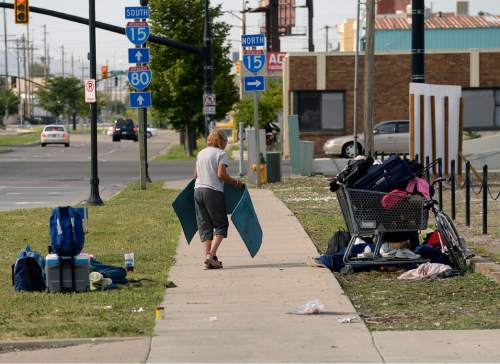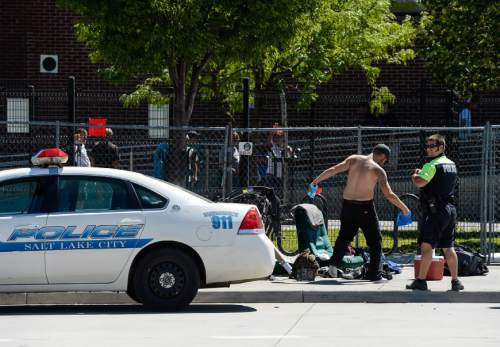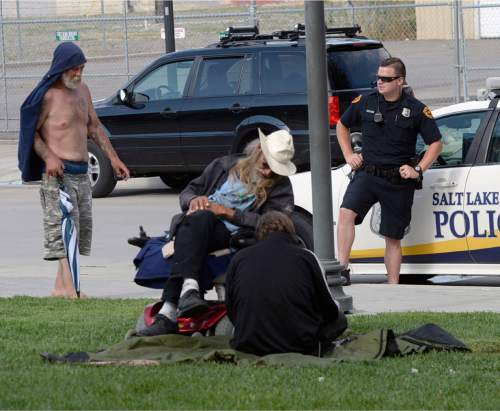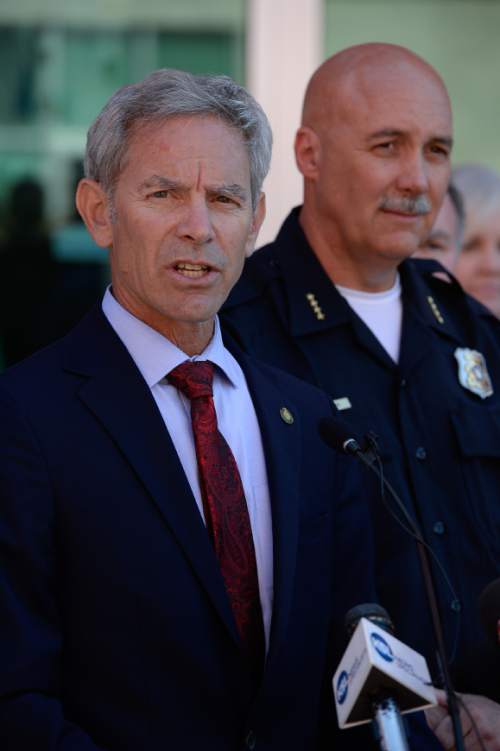This is an archived article that was published on sltrib.com in 2015, and information in the article may be outdated. It is provided only for personal research purposes and may not be reprinted.
Homelessness is an important topic among Salt Lake City voters, nearly two-thirds of whom say it is at a critical stage.
A poll commissioned by The Salt Lake Tribune found that 64 percent found homelessness downtown to be a "major problem." Another 30 percent labeled it a "minor problem." Only 4 percent said it was "no problem at all."
The poll conducted by SurveyUSA from July 13 to July 21 among 662 registered Salt Lake City voters has a margin of error of plus or minus 3.7 percentage points.
A debate continues surrounding whether The Road Home shelter and other services should be moved out of the Pioneer Park area.
The survey found that 39 percent said those facilities should be improved rather the moved. A fourth said the facilities and services should be moved, and 30 percent said a new homeless campus should be built either in the Rio Grande area or somewhere else.
The fact that the public now sees homelessness as an urgent matter may help propel changes in services, programs and facilities, according to some.
Nonetheless, Mayor Ralph Becker's political opponents say he is not doing enough.
Last week, the two-term mayor announced a new public-safety initiative in the Rio Grande district near The Road Home shelter aimed at cracking down on drug trafficking. The program also includes eight social workers to help direct homeless people into treatment and other programs.
—
Working on answers • Late last year, Becker assembled a commission of some 30 community leaders and homeless-service providers to seek improvements in facilities and the environment for the homeless in the neighborhood. The commission's recommendations are due by year's end.
Simultaneously, Salt Lake County Mayor Ben McAdams is conducting an analysis of the efficiencies of county expenditures on homeless services.
Becker conceded Friday that combating the issues surrounding homelessness will take much more work. "We aren't going to wave a wand and say some platitudes and get this fixed."
Nonetheless, the community's successful "housing first" program aimed at eliminating chronic homelessness provides a model. (Chronic homelessness is defined as being homeless for more than one year or being homeless several times over three years.)
"I want to see results before we claim success. But we are on track to change that neighborhood," Becker said of the area around Pioneer Park. "We'll keep up our efforts until we get success."
Although the homeless population downtown continues to bring daunting challenges, including drug trafficking, City Council Chairman Luke Garrot said the public acknowledgment (according to the poll) of the problem is a good thing.
"It's heartening," he said. "I'm looking at this as a community opportunity to address extreme poverty."
—
Leadership needed • Garrott, who is challenging Becker in the mayoral election, said a key to battling homelessness is setting goals with measures for success. "We haven't had that kind of leadership to this point."
Although homeless people are concentrated in the Rio Grande area, in the District 4 area Garrott represents, he said it is increasingly becoming an issue in other parts of the city.
"I see a lot of goodwill in the community," he said. "We have a historic opportunity to address this issue as a city, county and state."
The problems surrounding homelessness have reached a new level, according to former state legislator Jackie Biskupski, who also is running for mayor.
"No doubt it's at a critical stage," she said. "On any given night you have 1,200 people staying at the shelter."
Biskupski, who is a top administrator for Salt Lake County Sheriff Jim Winder, said she doubts the mayor's new public-safety initiative will make a lasting difference. She added that she also has been skeptical of the mayor's commission.
"You can't just leave this in the hands of the heavy hitters," she said of the group's membership. "It needs community input and collaborative leadership."
Among the needed upgrades is separating homeless families from the male population, she said. Although homeless services are centered in Salt Lake City, people seeking them come from all over the state.
"Other municipalities," she said, "are inevitably going to have to take some responsibility."
—
Biggest issue • The environment faced by homeless people in and around the shelters is nothing short of shameful, said George Chapman, a community activist running for mayor. Children are exposed to drugs and needles and filth and violence, he said.
"This is the biggest issue in Salt Lake City," he added. "I'm glad voters are realizing this is an issue that can be ignored no longer."
The mayor's new police program in the area doesn't go far enough, Chapman said. Many more cops walking the street are necessary.
Further, Chapman said, it's important to increase programs and facilities for treatment for alcoholism, drug addiction and mental illness.
"They need a more inviting place to go," Chapman said. "The Road Home is so unsafe they don't want to go there."
It's an election year and that means a lot of discussion, said businessman and mayoral candidate Dave Robinson, who added that he fears the homeless issue is being politicized.
Nonetheless, he said, homeless-service providers are not getting enough leadership from City Hall.
Although the "housing first" program has been successful, it needs improvements, including providing access to transportation, even giving free bus passes to participants.
Robinson, too, said outreach should be increased to treat homeless drug addicts. "Once we get them treated, we need to break the pattern with education and job training."
A primary election is slated for Aug. 11. The two top vote-getters will face off Nov. 3.









